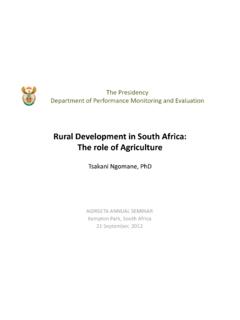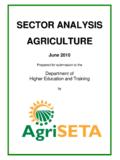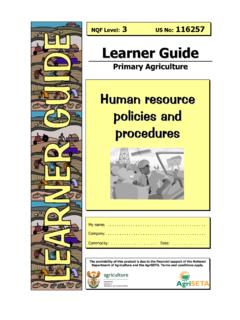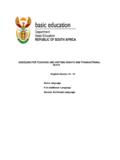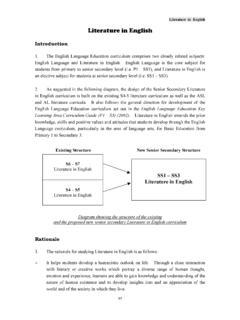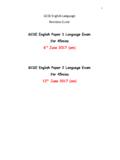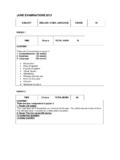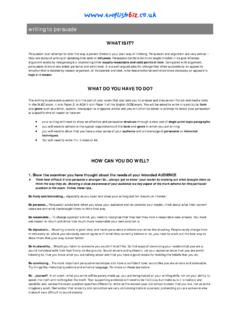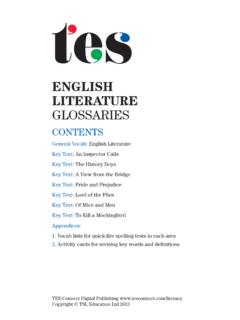Transcription of 12462-69-70 Learner Guide BE 29Aug06
1 NQF Level: 1 12462, US No: 12469 & 12470. Learner Guide Primary Agriculture Co m m u ni c a t i n g In f o r m a t i o n My name: .. Company: .. Commodity: .. Date: .. The availability of this product is due to the financial support of the National Department of Agriculture and the AgriSETA. Terms and conditions apply. Engage in a range of speaking and listening interactions for a variety of purposes Read and Respond to a range of text types Write for a Variety of different purposes 2. Primary Agriculture NQF Level 1 Unit Standard No: 12462-69-70 . Before we start . Dear Learner - This Learner Guide contains all the information to acquire all the knowledge and skills leading to the listed unit standards: Title: Engage in a range of speaking and listening interactions for a variety of purposes US No: 12462 NQF Level: 1 Credits: 6.
2 Read and Respond to a range of text types US No: 12469 NQF Level: 1 Credits: 6. Write for a Variety of different purposes US No: 12470 NQF Level: 1 Credits: 6. The full unit standard will be handed to you by your facilitator. Please read the unit standard at your own time. Whilst reading the unit standard, make a note of your questions and aspects that you do not understand, and discuss it with your facilitator. This unit standard is one of the building blocks in the qualifications listed below. Please mark the qualification you are currently doing: Title ID Number NQF Level Credits Mark National Certificate in Animal Production 48970 1 120. National Certificate in Mixed Farming Systems 48971 1 120. National Certificate in Plant Production 48972 1 120. Are you enrolled in a: Y N. Please mark the learning program you Learnership?
3 Are enrolled in: Skills Program? Your facilitator should explain the above Short Course? concepts to you. You will also be handed a Learner Workbook. This Learner Workbook should be used in conjunction with this Learner Guide . The Learner Workbook contains the activities that you will be expected to do during the course of your study. Please keep the activities that you have completed as part of your Portfolio of Evidence, which will be required during your final assessment. You will be assessed during the course of your study. This is called formative assessment. You will also be assessed on completion of this unit standard. This is called summative assessment. Before your assessment, your assessor will discuss the unit standard with you. Enjoy this learning experience! Version: 01 Version Date: July 2006.
4 Engage in a range of speaking and listening interactions for a variety of purposes Read and Respond to a range of text types Write for a Variety of different purposes 3. Primary Agriculture NQF Level 1 Unit Standard No: 12462-69-70 . How to use this Guide . Throughout this Guide , you will come across certain re-occurring boxes . These boxes each represent a certain aspect of the learning process, containing information, which would help you with the identification and understanding of these aspects. The following is a list of these boxes and what they represent: What does it mean? Each learning field is characterized by unique terms and definitions it is important to know and use these terms and definitions correctly. These terms and definitions are highlighted throughout the Guide in this manner. You will be requested to complete activities, which could be group activities, or individual activities.
5 Please remember to complete the activities, as the facilitator will assess it and these will become part of your portfolio of evidence. Activities, whether group or individual activities, will be described in this box. Examples of certain The following box indicates a summary of concepts or principles to concepts that we have covered, and offers help you contextualise you an opportunity to ask questions to your them easier, will be facilitator if you are still feeling unsure of the shown in this box. concepts listed. My Notes . You can use this box to jot down questions you might have, words that you do not understand, instructions given by the facilitator or explanations given by the facilitator or any other remarks that will help you to understand the work better.. Version: 01 Version Date: July 2006.
6 Engage in a range of speaking and listening interactions for a variety of purposes Read and Respond to a range of text types Write for a Variety of different purposes 4. Primary Agriculture NQF Level 1 Unit Standard No: 12462-69-70 . What are we going to learn? What will I be able to do? .. 5. Learning Outcomes .. 5. What do I need to know? .. 6. Session 1: Using information .. 7. Session 2: Communicate in writing .. 34. Session 3: Verbal communication .. 48. Session 4: Aesthetic, emotive, cultural and social aspects of communication 64. Session 5: The use of conventions and structures of communication .. 73. Bibliography .. 86. Terms & Conditions .. 86. Acknowledgements .. 87. SAQA Unit Standards Version: 01 Version Date: July 2006. Engage in a range of speaking and listening interactions for a variety of purposes Read and Respond to a range of text types Write for a Variety of different purposes 5.
7 Primary Agriculture NQF Level 1 Unit Standard No: 12462-69-70 . What will I be able to do? When you have achieved this unit standard, you will be able to: Interact orally with others in various contexts and situations for a variety of purposes. learners will be able to communicate reasonably confidently through developing an understanding of how listening and speaking strategies and skills can improve understanding between individuals and in groups. Read or view a number of different kinds of texts developed for different purposes, audiences and contexts. Understand how language is used to convey meaning, and to shape people's views and relationships. learners will be able to find, sort and use information through reading. Produce a range of different text types for different purposes, audiences and contexts.
8 Write reasonably clearly in order to communicate meaning, and show some control of grammar and style. Be familiar with a range of structuring devices and conventions that help convey meaning, and will develop competence in the writing process through reflecting on and correcting their own written work. Use language appropriate to the socio-cultural, learning, or workplace/technical environments as required. Learning Outcomes When you have achieved this unit standard, you will be able to: Use speaking and listening strategies. Identify the purpose, audience and context of the communication. Use strategies to engage with meaning and organisation in communication. Show a critical awareness of language use in oral texts. Use and respond to aesthetic, emotive, cultural and social aspects of oral texts. Use reading strategies appropriately and effectively.
9 Identify the purpose, audience and context of texts. Engage with meaning and organisation in texts. Show a critical awareness of language usage in texts. Version: 01 Version Date: July 2006. Engage in a range of speaking and listening interactions for a variety of purposes Read and Respond to a range of text types Write for a Variety of different purposes 6. Primary Agriculture NQF Level 1 Unit Standard No: 12462-69-70 . Identify and respond to aesthetic, emotive, cultural and social aspects of texts. Understand the use of conventions and structures in texts. Produce texts appropriate to purpose, audience and context. Use grammatical structures to organise texts. Use writing conventions to organise texts. Plan, draft and edit own writing. What do I need to Know? Listening, Speaking, Reading and Writing skills at ABET 3 or equivalent.
10 Version: 01 Version Date: July 2006. Engage in a range of speaking and listening interactions for a variety of purposes Read and Respond to a range of text types Write for a Variety of different purposes 7. Primary Agriculture NQF Level 1 Unit Standard No: 12462-69-70 . Session 1 U s i n g i n f or m a t i on This is an integrated session and covers various Specific Outcomes and Assessment Criteria of the THREE unit standards listed on the second page of this Learner Guide . Using information in daily life Communicating information is part of our daily lives. We do it in our personal lives, in social settings, in schools or other institutions of learning, in the world-of-work, etc. We receive information through our senses, namely smelling (nose), hearing (ears), seeing (eyes), touching (hands, skin, body) and tasting (tongue).


